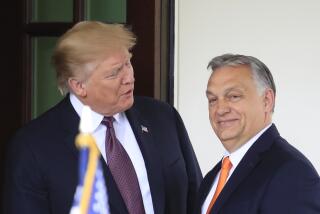Campaigns lock horns on foreign policy before Romney’s tour abroad
WASHINGTON — Mitt Romney prepared Monday to travel overseas for the now-traditional “grand tour” portion of the presidential campaign.
As it was for past White House hopefuls including President Obama, Romney’s trip abroad is a chance to help voters see the former governor and corporate CEO as a statesman — a chance to take some photos that read “potential president.”
According to custom, however, it’s not a time to air political laundry abroad. So, the partisan back-and-forth — which took a brief hiatus over the weekend in the wake of the Aurora, Colo., shooting — is likely to subside somewhat while Romney jaunts to London, Israel and Poland on his seven-day trip.
The campaigns on Monday took the chance to get some of the firepower out ahead of time.
President Obama’s campaign quickly transitioned from complaining about Romney’s alleged financial secrecy to what it labeled his foreign policy secrecy. In a conference call with reporters, former administration aides argued that Romney should be expected to use his trip to disclose details on how his policies would differ from the president’s — most notably on the war in Afghanistan, on support for Israel and on Obama’s “reset” of relations with Russia.
Romney has been broadly critical of the president on each front. However, in an election laser-focused on the economy, he has yet to speak at length and in detail about his alternative approach.
Romney hasn’t committed to the NATO timeline for withdrawal from Afghanistan, suggesting the policy is motivated by politics, not conditions on the ground. But he has been reluctant to argue that the U.S. engagement should be open-ended. He and his advisors have described the president’s posture toward Moscow as weak, but when Romney described Russia as our “No.1 geopolitical foe” the label drew criticism from both Republicans and Democrats. On Israel, Romney has said he would be a stronger ally.
Romney aides have said not to expect the former Massachusetts governor to make any major policy announcements.
“We face a number of challenges going forward and they can’t be faced with political talking points and platitudes and criticizing your opponent,” Michele Flournoy, the former undersecretary of Defense for policy, told reporters Monday. “They really require serious people with serious ideas and people who understand the complexity of the world we live in. Romney hasn’t really told us yet how we would confront these challenges.”
Flournoy said U.S. alliances were stronger now than any time in recent memory, downplaying the recent friction between Obama administration and Russian President Vladimir Putin and flareups between the Obama administration and Israeli Prime Minister Benjamin Netanyahu.
Colin Kahl, a former deputy assistant secretary of Defense for the Middle East, added that Obama would probably visit Israel if he wins a second term. The president has not visited the country since he was a candidate.
“In no region of the world is our country’s influence any stronger than it was four years ago,” Romney spokesman Ryan Williams responded. “President Obama has failed to restore our economy, is weakening our military with devastating defense cuts and has diminished our moral authority. Gov. Romney will restore the pillars of American strength to secure our interests and defend our values.”
Obama campaign allies did their best to try to put the pressure on Romney to explain how he would do this.
Former White House spokesman Robert Gibbs suggested that Romney’s trip itinerary was light on policy and heavy on politics. Gibbs went through Obama’s 2008 foreign trip itinerary — which included his speech to 200,000 people at the Victory Column in Berlin — to argue that Obama’s trip was more substantive.
“We did not do fundraisers on our trip,” Gibbs said, even as he acknowledged the Obama campaign regularly solicits expatriates living abroad. “In many ways some of the early itinerary looks like Romney’s trip might be entirely built around fundraising.”
The Romney campaign noted that Obama raised money almost immediately off the Berlin speech.
Follow Politics Now on Twitter
kathleen.hennessey@latimes.com
Twitter: @khennessey
More to Read
Get the L.A. Times Politics newsletter
Deeply reported insights into legislation, politics and policy from Sacramento, Washington and beyond. In your inbox three times per week.
You may occasionally receive promotional content from the Los Angeles Times.











